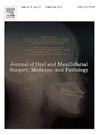抗egfr抗体免疫毒素改善唾液腺癌A253细胞系的细胞毒性作用
IF 0.4
Q4 DENTISTRY, ORAL SURGERY & MEDICINE
Journal of Oral and Maxillofacial Surgery Medicine and Pathology
Pub Date : 2024-11-13
DOI:10.1016/j.ajoms.2024.11.003
引用次数: 0
摘要
目的涎腺癌在头颈部肿瘤中所占比例较小,约为3 ~ 5%。近年来,可用于头颈部癌症(包括唾液腺癌)的抗体药物的范围一直在扩大。然而,尽管靶蛋白高表达,但报告显示临床疗效不足。我们的研究一直在探索使用免疫毒素(ITs)来改善头颈部癌症抗体药物的细胞毒性作用的方法,免疫毒素是与毒素结合的抗体。我们对鳞状细胞癌的研究表明,促进ITs的内体逃逸可以改善其细胞毒性作用。因此,本研究旨在证实it -西妥昔单抗(Cmab)的抗肿瘤作用。Cmab是西妥昔单抗与一种毒素结合,针对唾液腺癌——一种除了手术之外有效治疗选择有限的癌症。方法证实表皮生长因子受体(EGFR)在人涎腺导管癌细胞系A253中的蛋白表达和mRNA表达。我们分析了皂苷偶联抗egfr抗体(IT-Cmab)的细胞毒性。结果EGFR在A253中的表达明显高于高表达EGFR的表皮样癌细胞A431。单独Cmab没有细胞毒作用,但IT-Cmab在A253中表现出浓度依赖性的细胞毒作用。我们揭示了IT-Cmab对唾液腺癌细胞的有希望的细胞毒性作用。结论我们首次在体外实验中证实了IT对唾液腺肿瘤的细胞毒性作用。我们使用的IT,西妥昔单抗毒素结合抗体可能是唾液腺癌的一个显着的治疗选择。本文章由计算机程序翻译,如有差异,请以英文原文为准。
Anti-EGFR antibody immunotoxins improve cytotoxic effects in the salivary gland cancer A253 cell line
Objective
Salivary gland cancers account for a relatively small proportion, accounting for 3–5 %, among head and neck cancers. The range of antibody drugs available for head and neck cancers, including salivary gland cancers, has been expanding in recent years. However, reports indicated insufficient clinical efficacy despite high target expression. Our research has been investigating methods to improve the cytotoxic effects of antibody drugs in head and neck cancers, using immunotoxins (ITs), which are antibodies conjugated with toxins. Our studies on squamous cell carcinoma, which constitutes the majority of head and neck cancers, indicated that promoting endosomal escape of ITs improves their cytotoxic effects. Therefore, the current study aimed to confirm the antitumor effects of IT-Cetuximab (Cmab), which is cetuximab conjugated with a toxin, targeting salivary gland cancers—a type of cancer with limited effective treatment options aside from surgery.
Methods
We confirmed protein and mRNA expression of epidermal growth factor receptor (EGFR) in the human salivary duct carcinoma cell line, A253. We analyzed the cytotoxicity of saporin-conjugated anti-EGFR antibody (IT-Cmab).
Results
EGFR expression in A253 was comparably higher than in epidermoid carcinoma cell line A431 which highly expresses EGFR. Cmab alone exhibited no cytotoxic effects, but IT-Cmab demonstrated concentration-dependent cytotoxic effects in A253. We revealed the promising cytotoxic effects of IT-Cmab in salivary gland cancer cells.
Conclusion
We first demonstrate the cytotoxic effects of IT in salivary gland cancers in vitro. The IT we used, cetuximab toxin conjugated antibody may be a remarkable treatment option for salivary gland cancers.
求助全文
通过发布文献求助,成功后即可免费获取论文全文。
去求助
来源期刊

Journal of Oral and Maxillofacial Surgery Medicine and Pathology
DENTISTRY, ORAL SURGERY & MEDICINE-
CiteScore
0.80
自引率
0.00%
发文量
129
审稿时长
83 days
 求助内容:
求助内容: 应助结果提醒方式:
应助结果提醒方式:


